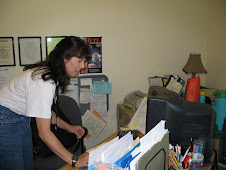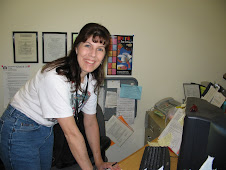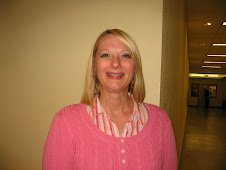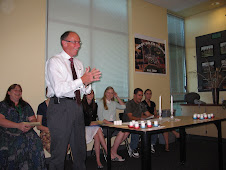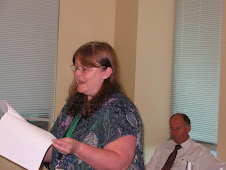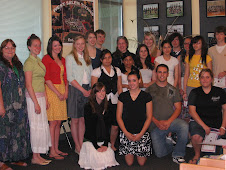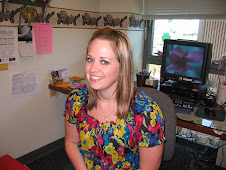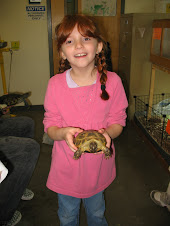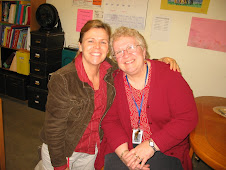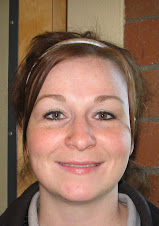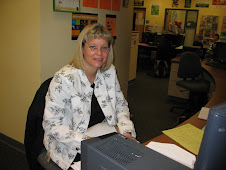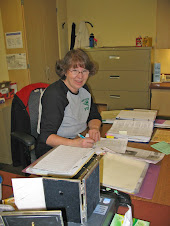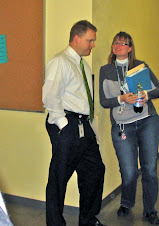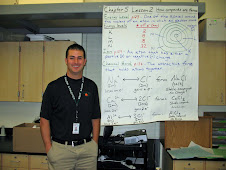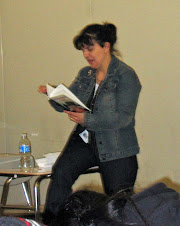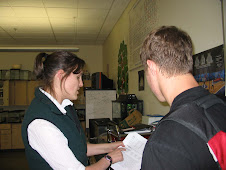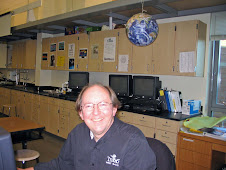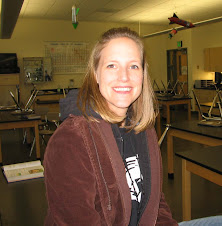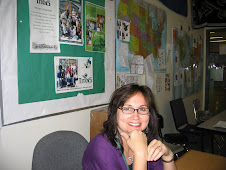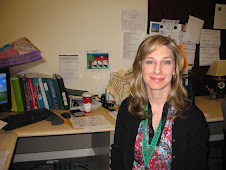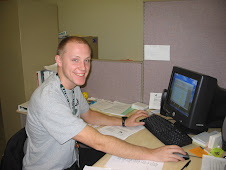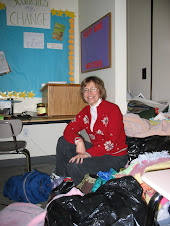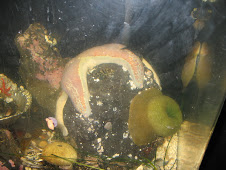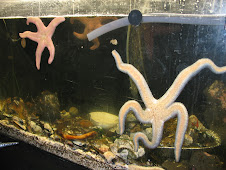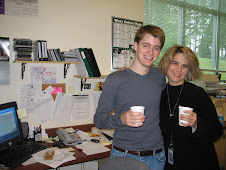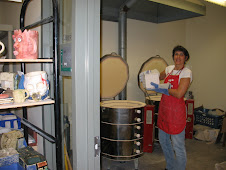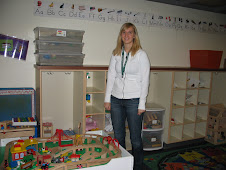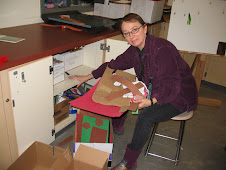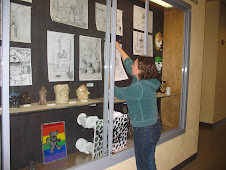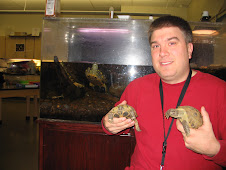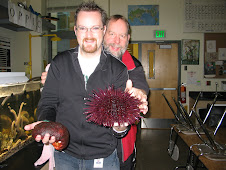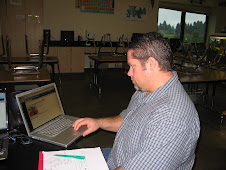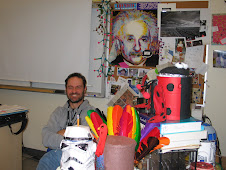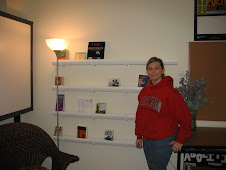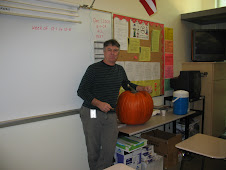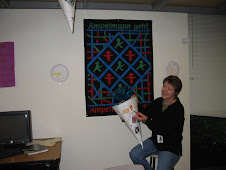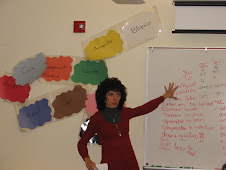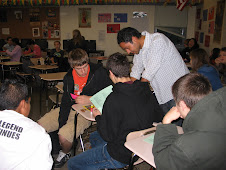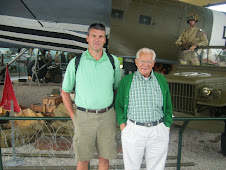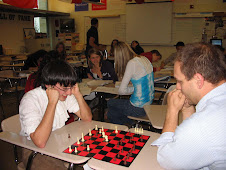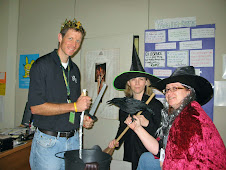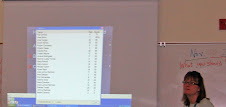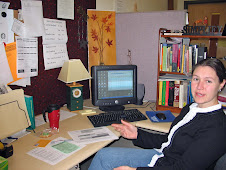
--Tom Hanks, American actor, in "Forrest Gump"
Behold the lowly turtle. He makes no progress without sticking his neck out. At West we stick our necks out for kids.

 Kara shows excitement over the bacteria her students are growing in her lab.
Kara shows excitement over the bacteria her students are growing in her lab. Carol shows excitement about depositing money in the MAPS credit union and about the new books she has just received "Good to GREAT!"
Carol shows excitement about depositing money in the MAPS credit union and about the new books she has just received "Good to GREAT!" (Lynne's students under Teena's guidance serve a large following in the Wake Up Cafe just before the first bell.)
(Lynne's students under Teena's guidance serve a large following in the Wake Up Cafe just before the first bell.) (Cynthia's students word process letters to troops in Afghanistan.) Others working one-on-one to secure this link include Jan, Janice, Jacquie, Jim, Jude, Taylor, Ted, Bryan and Ann. Teresia will be helping students write stories with at least three incidents. Michelle will be using WIKIS and BLOGS to facilitate teamwork in her careers class. (Go to http://www.nicenet.org/ and enter code E6668EW46 to try out this wiki. Enter yourself as a student and alert me that you did at wshsfrench@hotmail.com . I'd like to try it out.)
(Cynthia's students word process letters to troops in Afghanistan.) Others working one-on-one to secure this link include Jan, Janice, Jacquie, Jim, Jude, Taylor, Ted, Bryan and Ann. Teresia will be helping students write stories with at least three incidents. Michelle will be using WIKIS and BLOGS to facilitate teamwork in her careers class. (Go to http://www.nicenet.org/ and enter code E6668EW46 to try out this wiki. Enter yourself as a student and alert me that you did at wshsfrench@hotmail.com . I'd like to try it out.) (I finally got a snapshot of Ike.)
(I finally got a snapshot of Ike.) with support from Dan, Josh, Sarah, Elaine, Carissa and Pamella. Jason's students will be using Venn diagrams to compare such things as temporary vs permanent effects of drugs in English and Carlos' students will be using such things as food ads to compare foods and prices in Spanish. Ressi, Susan and Barb B. will have books displayed in rain gutter shelves - cover side out - per research to promote reading for enjoyment - thanks to grants received. Pattie will be sitting atop piles of blankets and school supplies surrounded by Students for Change who will send them to Afghanistan - (Make sure you take Pattie off the pile first.) Grant might be bound to a post with colored duct tape to raise money for good causes while expounding wisdom on writing and other "stuff". John D might be guiding students through SQUEEPERS - survey, question, predict, read, review and summarize. He will tell me that "stuff" is a dead word. Derek will be collaborating with Chris V. and Kara on writing up and rating nuclear energy research papers. Chris V. will be using Bloom's levels of thinking to review life in the 20's - explain five major events - discuss five important names - analyze what would happen if.... Kara will be using scientific inquiry to assess the qualities of solids, liquids and gases. No! She will be the new science instructional coach. Laura and Amy will be collaborating on Twelfth Night character trait essays with sources cited in MLA format. Christina will be reciting Poe's poetry with his raven on her shoulder. Liz, Talana and Candy will be reading the latest and greatest reads - graphic novels about vampires anyone? Bryan H will be making Much Ado About Nothing if students have nothing to turn in translated from Shakespeare's English to modern day script.
with support from Dan, Josh, Sarah, Elaine, Carissa and Pamella. Jason's students will be using Venn diagrams to compare such things as temporary vs permanent effects of drugs in English and Carlos' students will be using such things as food ads to compare foods and prices in Spanish. Ressi, Susan and Barb B. will have books displayed in rain gutter shelves - cover side out - per research to promote reading for enjoyment - thanks to grants received. Pattie will be sitting atop piles of blankets and school supplies surrounded by Students for Change who will send them to Afghanistan - (Make sure you take Pattie off the pile first.) Grant might be bound to a post with colored duct tape to raise money for good causes while expounding wisdom on writing and other "stuff". John D might be guiding students through SQUEEPERS - survey, question, predict, read, review and summarize. He will tell me that "stuff" is a dead word. Derek will be collaborating with Chris V. and Kara on writing up and rating nuclear energy research papers. Chris V. will be using Bloom's levels of thinking to review life in the 20's - explain five major events - discuss five important names - analyze what would happen if.... Kara will be using scientific inquiry to assess the qualities of solids, liquids and gases. No! She will be the new science instructional coach. Laura and Amy will be collaborating on Twelfth Night character trait essays with sources cited in MLA format. Christina will be reciting Poe's poetry with his raven on her shoulder. Liz, Talana and Candy will be reading the latest and greatest reads - graphic novels about vampires anyone? Bryan H will be making Much Ado About Nothing if students have nothing to turn in translated from Shakespeare's English to modern day script.  (Bryan transformed at Prom) As we know, Failure is Not an Option at West. Katie will assist students online while Ann keeps students in line with our 100% test participation goals. Karina, Linda and Barbara will be tapping student effort while checking for comprehension. Lily, Toby, Dave H. and Madalyn will be conferencing with students and parents with graduation in mind. Sarah will be telling them "where to go" for the next step upward. Dave F. will be teaching vocational skills with good recyling habits in mind. Julie Ann and Bobby will be collaborating on analyzing quiz/test questions to assess student progress in math skills. Jon will be reviewing the Pythagorean Theorem. Kevin C will be teaching how to read and follow directions in order to make a Mobius Strip. Kevin G will be hanging chart paper with complete lesson objects and chapter outlines. Jeremy's class will be shooting off water rockets while Mike's class will be shooting off solid fuel rockets - written reports to follow. Andy will be referring to the order of operations doing number puzzles and incorporating literacy in math through Fantasy Football (i.e. read a table for information.) Robert will be modeling the use of the GRM in learning about slope using direct instruction followed by shared and guided instruction through teamwork. Homework will provide the intentional independent element. The slope of student learning will be on the rise. Joe L. will be posing higher level thinking questions to ESL students who are applying and translating among mathematical representations to solve problems (MA.CM.PS.01-05) like how many hamburgers did student x sell compared to student y.... Check out his personal math video for the answer. Joe R. will be using authentic situations and Pi on the wall (Yes there is Pi on the wall in B111) to discuss and solidify vocabulary of Measures of Central Tendancy. Tate will be using think alouds to help students master ELS or essential learning skills. Krista's and Janis' classes will be cooking up sweet tastes and smells for teachers to test in the Black Box. Tara will be training students to teach tiny Titan Tots who will be Titan teens in no time. Michelle C's students will be presenting vocabulary posters and powerpoints to promote understanding of solubility. John B's students will be writing letters to the editor to convince the public that the Great Garbage Patch is real and we should do our part by asking for paper, or taking our own cloth sacks to the grocery store. Nikki B. will be back at West. Thanks to Eric for guiding her students while she was on leave. Larry and Scott C. will be golfing, but their past students will still remember the essays they wrote and graded on the four market structures, and monitoring their favorite stocks with "real" money invested. Ted D. will be supervising bridge building and Greg will be supervising robot building while Carol will be collaborating via electronic file folders with Matt to put Fireworks and Flash into web pages.
(Bryan transformed at Prom) As we know, Failure is Not an Option at West. Katie will assist students online while Ann keeps students in line with our 100% test participation goals. Karina, Linda and Barbara will be tapping student effort while checking for comprehension. Lily, Toby, Dave H. and Madalyn will be conferencing with students and parents with graduation in mind. Sarah will be telling them "where to go" for the next step upward. Dave F. will be teaching vocational skills with good recyling habits in mind. Julie Ann and Bobby will be collaborating on analyzing quiz/test questions to assess student progress in math skills. Jon will be reviewing the Pythagorean Theorem. Kevin C will be teaching how to read and follow directions in order to make a Mobius Strip. Kevin G will be hanging chart paper with complete lesson objects and chapter outlines. Jeremy's class will be shooting off water rockets while Mike's class will be shooting off solid fuel rockets - written reports to follow. Andy will be referring to the order of operations doing number puzzles and incorporating literacy in math through Fantasy Football (i.e. read a table for information.) Robert will be modeling the use of the GRM in learning about slope using direct instruction followed by shared and guided instruction through teamwork. Homework will provide the intentional independent element. The slope of student learning will be on the rise. Joe L. will be posing higher level thinking questions to ESL students who are applying and translating among mathematical representations to solve problems (MA.CM.PS.01-05) like how many hamburgers did student x sell compared to student y.... Check out his personal math video for the answer. Joe R. will be using authentic situations and Pi on the wall (Yes there is Pi on the wall in B111) to discuss and solidify vocabulary of Measures of Central Tendancy. Tate will be using think alouds to help students master ELS or essential learning skills. Krista's and Janis' classes will be cooking up sweet tastes and smells for teachers to test in the Black Box. Tara will be training students to teach tiny Titan Tots who will be Titan teens in no time. Michelle C's students will be presenting vocabulary posters and powerpoints to promote understanding of solubility. John B's students will be writing letters to the editor to convince the public that the Great Garbage Patch is real and we should do our part by asking for paper, or taking our own cloth sacks to the grocery store. Nikki B. will be back at West. Thanks to Eric for guiding her students while she was on leave. Larry and Scott C. will be golfing, but their past students will still remember the essays they wrote and graded on the four market structures, and monitoring their favorite stocks with "real" money invested. Ted D. will be supervising bridge building and Greg will be supervising robot building while Carol will be collaborating via electronic file folders with Matt to put Fireworks and Flash into web pages.  (...when she is not at MAPS with Marina.)Graham's class will be deciding whodunit based on evidence obtained through the titration of bodily fluids discovered at the crime scene. Resulting student videos may be available for weekend viewing. John O and Nikki P will be assessing student comprehension of the Great Depression or Immigration Issues through clickers and simulations. Pat will be cooking up real life uses for working with fractions. (The need becomes apparent when all your kids leave home and you divide fractions for meal-making; when they return with spouses and grandkids, you multiply fractions to feed the small army. ) Speaking of armies, Jay M.will be using T-charts for comparing religions and other similarities and differences, which often led to wars in European history. Steve will be reading about and sharing thoughts on Darwin's Origin of Species (Don't refer to it as "origin of life, " as we have no evidence of that, Steve reminds us.) Ty T will be teaching note-taking skills while investigating the events that led to WWII via PowerPoint. Jason will be reading a letter by Benjamin Franklin; students will be summarizing and resorting to Renzulli for extended applications. Carol's students will be working with Jana, Debra, Liz, Dianna, Rob, Gayle, Hanna, Nicole, Marcie and Katie (Nicole and friend get their exercise)
(...when she is not at MAPS with Marina.)Graham's class will be deciding whodunit based on evidence obtained through the titration of bodily fluids discovered at the crime scene. Resulting student videos may be available for weekend viewing. John O and Nikki P will be assessing student comprehension of the Great Depression or Immigration Issues through clickers and simulations. Pat will be cooking up real life uses for working with fractions. (The need becomes apparent when all your kids leave home and you divide fractions for meal-making; when they return with spouses and grandkids, you multiply fractions to feed the small army. ) Speaking of armies, Jay M.will be using T-charts for comparing religions and other similarities and differences, which often led to wars in European history. Steve will be reading about and sharing thoughts on Darwin's Origin of Species (Don't refer to it as "origin of life, " as we have no evidence of that, Steve reminds us.) Ty T will be teaching note-taking skills while investigating the events that led to WWII via PowerPoint. Jason will be reading a letter by Benjamin Franklin; students will be summarizing and resorting to Renzulli for extended applications. Carol's students will be working with Jana, Debra, Liz, Dianna, Rob, Gayle, Hanna, Nicole, Marcie and Katie (Nicole and friend get their exercise) to take her students and teachers alike from GOOD TO GREAT.
to take her students and teachers alike from GOOD TO GREAT.  For a better picture of these teachers and the rest of our wonderful staff and administrators, check out the year in review in previous entries.
For a better picture of these teachers and the rest of our wonderful staff and administrators, check out the year in review in previous entries. (Meri with son Lane)
(Meri with son Lane) (Papo supporting our ELL population)
(Papo supporting our ELL population) (Larry, SS teacher)
(Larry, SS teacher) (Scott, SS teacher)
(Scott, SS teacher)
Fisher, Frey and Lapp tell how to meet "AYP in a High-Need School..." (Journal of Adolescent & Adult Literacy, Feb 2009). Highlighted are once failing schools that have beat the odds and made impressive progress through integrating reading and writing into their daily operation, demonstrating the power of content literacy instruction. In one such school, a literacy team settled on the pedagogical goal of helping students develop literacy habits that they could take with them from class to class. (WOW, this sounds like Cynthia's goal with project planner and her study skills diversity project  based on Pattie's Afghanistan curriculum. )
based on Pattie's Afghanistan curriculum. ) The staff in the article was relieved that they had gained freedom from focusing on state tests. First, they discussed the 100 ways to engage in literacy learning and the fact that students experienced different instructional routines in every class. They decided to choose four intervention components with the following criteria:
The staff in the article was relieved that they had gained freedom from focusing on state tests. First, they discussed the 100 ways to engage in literacy learning and the fact that students experienced different instructional routines in every class. They decided to choose four intervention components with the following criteria:
The four components they chose were 1) Cornell Note-Taking to be used in all note-taking activities, 2) Think-Alouds, to be conducted with a piece of text every day in every class,
2) Think-Alouds, to be conducted with a piece of text every day in every class, 3) Writing to Learn, as a way to check for understanding in every class, every day,
3) Writing to Learn, as a way to check for understanding in every class, every day,  4) Dedicated Reading Time, or reading for 20 minutes a day.
4) Dedicated Reading Time, or reading for 20 minutes a day. Work in PLCs to create common formative assessments and to collect/analyze data, as well as participate in job-embedded training/professional development via the peer coach and collegial conversations led to staggering improvements over a two-year period. Some of the most motivating professional development activities were sharing videos of their own teachers. Think Karen,
Work in PLCs to create common formative assessments and to collect/analyze data, as well as participate in job-embedded training/professional development via the peer coach and collegial conversations led to staggering improvements over a two-year period. Some of the most motivating professional development activities were sharing videos of their own teachers. Think Karen,  Drew, Bobby, Julie Ann, Park, Carol, Greg, Terra and Janet, as compared to Seinfeld. Active learning was evident in the many classrooms I visited recently. Scott's class used jigsaw to discover the 7 Aspects of Totalitarianism and key policies and events that led up to WWII. Lane's class reflected on their attitudes towards AIDS through a journal write. Janet's students studied the foreign language of medical terminology repeating each term to aid pronunciation and memorization. Jon promoted Intentional Independent Reading to investigate characteristics of functions in Honors Geometry. Teresia modeled writing creating with the class a new segment for Homer Simpson featuring Bill Clinton and a pesky squirrel.
Drew, Bobby, Julie Ann, Park, Carol, Greg, Terra and Janet, as compared to Seinfeld. Active learning was evident in the many classrooms I visited recently. Scott's class used jigsaw to discover the 7 Aspects of Totalitarianism and key policies and events that led up to WWII. Lane's class reflected on their attitudes towards AIDS through a journal write. Janet's students studied the foreign language of medical terminology repeating each term to aid pronunciation and memorization. Jon promoted Intentional Independent Reading to investigate characteristics of functions in Honors Geometry. Teresia modeled writing creating with the class a new segment for Homer Simpson featuring Bill Clinton and a pesky squirrel. (Happy Birthday, Teresia.) Ressi engaged students in individual conferences about something they had been reading - was it Much Ado About Nothing? Students were working on a literacy scrapbook featuring notes about the same play side by side with their reflections. From what I have seen, students at West have no fear that they are wasting their time. They are busy reading, writing and talking about reading and writing, - what we need to see in our classrooms every day. Finally, here is my previous BLOG made into a wordle. Go to http://www.wordle.net/ Left click twice to get a bigger view.
(Happy Birthday, Teresia.) Ressi engaged students in individual conferences about something they had been reading - was it Much Ado About Nothing? Students were working on a literacy scrapbook featuring notes about the same play side by side with their reflections. From what I have seen, students at West have no fear that they are wasting their time. They are busy reading, writing and talking about reading and writing, - what we need to see in our classrooms every day. Finally, here is my previous BLOG made into a wordle. Go to http://www.wordle.net/ Left click twice to get a bigger view.© 2009 Jonathan Feinberg Terms of Use subscribe
 A book I read on the plane on my way home from the celebration, Tapping Student Effort by Steve Barkley, stresses the importance of helping our students establish their own vision of success. He talks especially about our intentional non-learners. Only by helping them find their strengths or abilities and showing them how just a little effort can multiply that ability can we hope to motivate them.
A book I read on the plane on my way home from the celebration, Tapping Student Effort by Steve Barkley, stresses the importance of helping our students establish their own vision of success. He talks especially about our intentional non-learners. Only by helping them find their strengths or abilities and showing them how just a little effort can multiply that ability can we hope to motivate them.  Janet points out our many students who have found their strengths and understand how effort multiplies their abilities. How do we help all of our students find their strengths? By getting to know them and helping them visualize the possibitilies instead of focusing on their weaknesses - by not giving up on them no matter what.
Janet points out our many students who have found their strengths and understand how effort multiplies their abilities. How do we help all of our students find their strengths? By getting to know them and helping them visualize the possibitilies instead of focusing on their weaknesses - by not giving up on them no matter what. Here one of Cynthia's freshman envisions what she will look like at graduation in her cap and gown with diploma in hand 4 years from now. All Cynthia's students were photographed so that they could imagine the possibilities. They carry their planners to every class in order to take the small steps in the right direction. The academic word for the week is appropriately ACHIEVE. Help them achieve by frequently encouraging the use of planners in your classes as a way to set goals and check off those small steps to future success.
Here one of Cynthia's freshman envisions what she will look like at graduation in her cap and gown with diploma in hand 4 years from now. All Cynthia's students were photographed so that they could imagine the possibilities. They carry their planners to every class in order to take the small steps in the right direction. The academic word for the week is appropriately ACHIEVE. Help them achieve by frequently encouraging the use of planners in your classes as a way to set goals and check off those small steps to future success. Susi models good health and personal fitness as well as a positive outlook for her students and West faculty. You would never know she has had her own personal obstacles to overcome - think pink.
Susi models good health and personal fitness as well as a positive outlook for her students and West faculty. You would never know she has had her own personal obstacles to overcome - think pink.  t
t Bobby and Julie Ann work diligently toward grading practices that give students immediate feedback on progress toward mastery of essential learning skills, using the results of those assessments to direct their next steps in lesson preparation. They exemplify teamwork and creative thinking in this effort which they are willing to share with West staff.
Bobby and Julie Ann work diligently toward grading practices that give students immediate feedback on progress toward mastery of essential learning skills, using the results of those assessments to direct their next steps in lesson preparation. They exemplify teamwork and creative thinking in this effort which they are willing to share with West staff. Pat helps our students in math lab and Algebra I visualize how we use math every day.
Pat helps our students in math lab and Algebra I visualize how we use math every day. Karen fosters higher level thinking skills through modeling literacy strategies for students doing research and shares her classroom via video with the faculty. Thanks, Karen.
Karen fosters higher level thinking skills through modeling literacy strategies for students doing research and shares her classroom via video with the faculty. Thanks, Karen.  Thanks to our media specialists, Liz, Candy and Talana for tech support and to Josh for making popcorn and Krista for providing helpers and treats. I was sorry to have to miss the show. Click here for a link to the bookmark you received - a pdf file from a website that also provides a wealth of other graphic organizers. Mary has used these same literacy strategies in a step-by-step version with her ELL's. See Say Something from Anita Archer.
Thanks to our media specialists, Liz, Candy and Talana for tech support and to Josh for making popcorn and Krista for providing helpers and treats. I was sorry to have to miss the show. Click here for a link to the bookmark you received - a pdf file from a website that also provides a wealth of other graphic organizers. Mary has used these same literacy strategies in a step-by-step version with her ELL's. See Say Something from Anita Archer.
 Papo strengthens connections between home and school adding support for ELL students.
Papo strengthens connections between home and school adding support for ELL students. Lisa holds students accountable for attendance, pointing to the correlation between regular attendance and success in school.
Lisa holds students accountable for attendance, pointing to the correlation between regular attendance and success in school. Nancy converses with her students in German to introduce and practice new vocabulary. Here she models guided reading, instructing her students in small groups through which differentiated learning opportunities are provided daily.
Nancy converses with her students in German to introduce and practice new vocabulary. Here she models guided reading, instructing her students in small groups through which differentiated learning opportunities are provided daily.  Other students practice vocabulary of their choice with Quizlet, a flashcard website which allows classrooms to set up their own personalized sets for familiarization, learning, testing and proficiency.
Other students practice vocabulary of their choice with Quizlet, a flashcard website which allows classrooms to set up their own personalized sets for familiarization, learning, testing and proficiency.
 He shares his ideas with students but reminds them that there are no definitive answers to this age old question of how life started on earth. Perhaps they will be the ones to discover the answers. Oh, the possibilities.
He shares his ideas with students but reminds them that there are no definitive answers to this age old question of how life started on earth. Perhaps they will be the ones to discover the answers. Oh, the possibilities.  Matt makes his expectations for project-based learning clear through checklists and rubrics. He uses a 5-point grading scale. Ask him about it.
Matt makes his expectations for project-based learning clear through checklists and rubrics. He uses a 5-point grading scale. Ask him about it. with Jeanette, Jolie, Bryan and Tami, but it may be almost as enlightening. You will discover new strengths and get a better vision of future possibilities. I am only an email away.
with Jeanette, Jolie, Bryan and Tami, but it may be almost as enlightening. You will discover new strengths and get a better vision of future possibilities. I am only an email away. The students, working as couples, budgeted, paid bills, saved money in the bank and bought treats until the Stock Market crashed. Then Nikki went around with pink slips for all the "husbands." No more $10 paychecks. They had to stretch their initial $100 over five years. By the end of the period, "families" were putting their children in orphanages
The students, working as couples, budgeted, paid bills, saved money in the bank and bought treats until the Stock Market crashed. Then Nikki went around with pink slips for all the "husbands." No more $10 paychecks. They had to stretch their initial $100 over five years. By the end of the period, "families" were putting their children in orphanages  because they couldn't buy them food. They were making their own clothes,
because they couldn't buy them food. They were making their own clothes,
 selling their cars and houses, and setting up cardboard box houses in Hooverville.
selling their cars and houses, and setting up cardboard box houses in Hooverville.  Nikki was trying this simulation for the first time. The students were totally engaged in living out the depression in "happiness," that is, ending up with at least $1
Nikki was trying this simulation for the first time. The students were totally engaged in living out the depression in "happiness," that is, ending up with at least $1
 and not having to go to jail.
and not having to go to jail.











